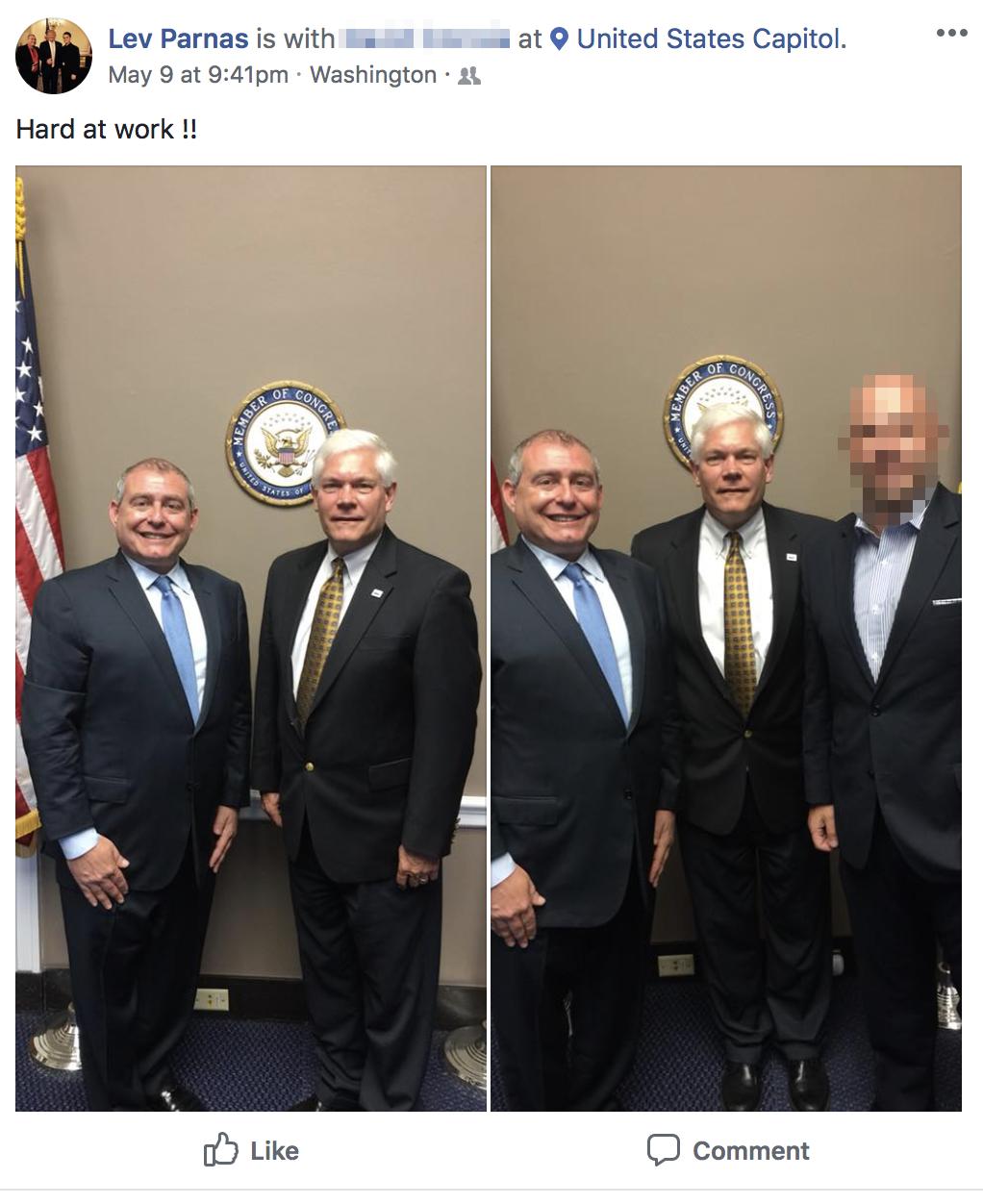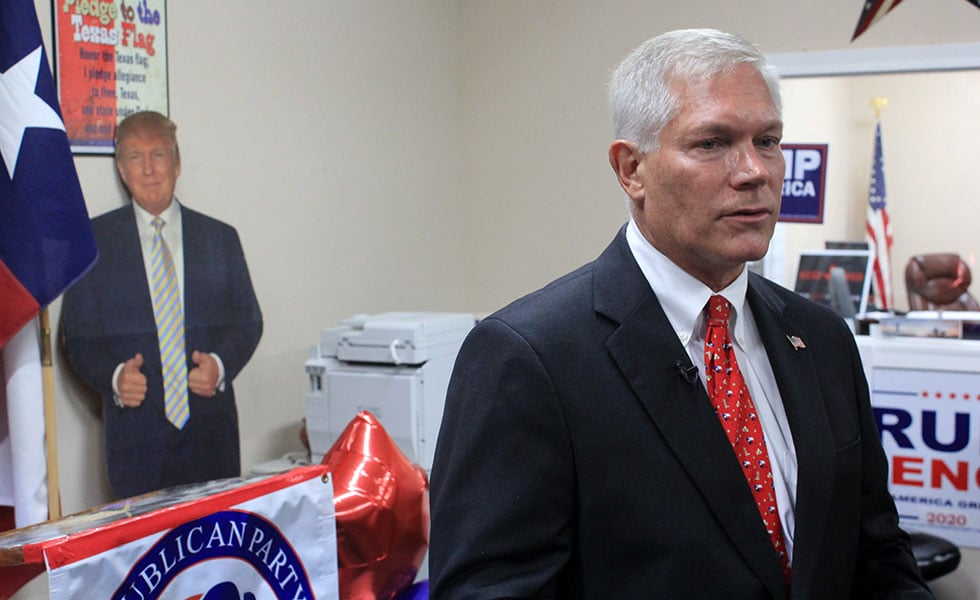Former Dallas Congressman Pete Sessions’ attempt at a political comeback in a new congressional district was already embattled. When Sessions announced his campaign for the 17th Congressional District in Waco in early October, some local Republicans said he was a carpetbagger trying to bigfoot his way back into power after losing his Dallas congressional seat in 2018.
Then, late last week, Sessions’ path back to Washington, D.C., started to look far more like a difficult climb. The former congressman was formally brought into the whirling scandal around the White House and Ukraine that had also caught up President Donald Trump, as well as his personal lawyer Rudy Giuliani. A federal indictment against two of Giuliani’s associates for allegedly funneling Russian money into U.S. elections referenced a “Congressman-1” who, it quickly became clear, was Pete Sessions.
Lev Parnas and Igor Fruman, two Soviet-born American citizens, had acted as straw donors to funnel foreign cash into U.S. elections and used a front company to conceal the source of their contributions. It was all an effort to “buy political influence” with elected officials, including “Congressman-1,” according to the indictment. The Observer first reported on Sessions’ connections to Parnas and Fruman on October 4.

In May 2018, Parnas and Fruman met with Sessions at his office on Capitol Hill and sought “Congressman-1’s assistance in causing the US Government to remove or recall the then-US Ambassador to Ukraine,” according to the indictment. It alleges that “Parnas’s efforts to remove the Ambassador were conducted, at least in part, at the request of one or more Ukrainian government officials.” As BuzzFeed reported earlier this year, on the same day that Parnas posted a Facebook photo of his meeting with Sessions, the former congressman wrote a letter to Secretary of State Mike Pompeo recommending that he fire the ambassador to Ukraine, Marie Yovanovitch. “I have received notice from close companions that Ambassador Yovanovitch has spoken privately and repeatedly about her disdain for the current administration,” he wrote.
Parnas and Fruman were clients and associates of Rudy Giuliani, a longtime friend and political ally of Sessions. Giuliani was a central player in ousting Yovanovitch, and Parnas and Fruman apparently helped connect him with top officials in the Ukrainian government. Giuliani has drawn immense scrutiny in recent weeks for his efforts to dig up dirt on former Vice President Joe Biden and other Democrats in Ukraine. House Democrats recently launched an impeachment inquiry into what appears to be an attempted quid pro quo by Trump to press Ukraine President Volodymyr Zelensky to investigate Biden and his son Hunter while simultaneously withholding foreign aid money.
Around the same time that Parnas and Fruman met with Sessions on Capitol Hill, they also met Sessions at an event hosted by a political action committee and pledged to raise at least $20,000 for his campaign. Fruman had already given the federal contribution limit of $2,700 to Sessions’ campaign; as the indictment alleges, he gave another $2,700 under Parnas’ name, a violation of campaign finance laws.
Before the indictment was unsealed, Sessions acknowledged his ties to Parnas and Fruman during an interview on Lone Star Politics. “This was during the campaign, early in the campaign, and they did come by my office and I did meet them and I did meet them off the Hill and they did become contributors … That is not unusual for you to meet people who then become contributors.”

“Congressman-1” is not accused of any crimes in the indictment, and Sessions issued a statement after the indictment was made public denying any wrongdoing. He referred to a line in the indictment that stated that the defendants “concealed the scheme from the candidates, campaigns and federal regulators.”
“Therefore, if I am ‘Congressman One’, I could not have had any knowledge of the scheme described in the indictment or have involvement or coordination of it,” he said in the statement. He said that he was first approached by Parnas and Fruman for a meeting about energy independence in Ukraine and that “[t]here was no request in that meeting and I took no action.”
“Over time, I recall that there were a couple additional meetings. Again, at no time did I take any official action after these meetings,” Sessions said in the statement.
Sessions told BuzzFeed earlier this year that he “sought input” from Parnas and Fruman about Ambassador Yovanovitch and Parnas said he told Sessions that she had been “bad-mouthing our president about getting impeached.” In his statement, Sessions insisted that his decision to write an official letter to Secretary Pompeo was unrelated to his discussions with the two men. “Separately, after several congressional colleagues reported to me that the current U.S. Ambassador to Ukraine was disparaging President Trump to others as part of those official duties, I wrote a letter to the Secretary of State to refer this matter directly.”
Sessions believes that he was initially approached by the two men because of his role in the GOP leadership and his position as head of the Turkey Caucus, a source close to Sessions told the Observer. The source also said that Sessions does not believe that Giuliani was initially involved but that he attended “at least one” of the later meetings. Sessions’ campaign has not provided any more details about the dates or locations of those meetings, or the extent of Giuliani’s involvement.
He acknowledged that he had been friends with Giuliani for “more than 30 years” but sought to distance himself in the statement: “I do not know what his business or legal activities in Ukraine have been.”
Fruman and Parnas also contributed $325,000 to the pro-Trump super PAC America First Action using an alleged shell company called Global Energy Partners. That contribution quickly drew suspicions and prompted a campaign finance watchdog to file a complaint with the Federal Election Commission. The super PAC has since told reporters that the contribution was placed in a “segregated bank account” and was never spent.
America First Action spent more than $3 million on behalf of Sessions in his failed 2018 reelection campaign against Democrat Colin Allred. Roy Bailey, a Dallas-based financier and lobbyist, has been Sessions’ longtime campaign finance chair and is a business associate of Giuliani. He was also a top fundraising official for the America First Action super PAC in 2018.
As the Daily Beast reported last week, American First Action’s robust support for Sessions may have pushed the boundaries of—and potentially violated—the federal laws restricting super PAC coordination with political candidates. Sessions’ campaign and America First Action used two closely linked media-buying firms to place TV ads and the same official approved ad bookings for both the Sessions campaign and the super PAC. America First Action denied that there was any sort of illegal coordination. Watchdogs see this tactic of using a shared vendor as an abuse and potential violation of campaign finance laws: America Media & Advocacy Group was targeted with a FEC complaint for using the same tactic with the National Rifle Association.
Sessions, Bailey, and Giuliani have long been close. Bailey has long been a top executive at Giuliani Partners and was a campaign chair for the former New York Mayor’s presidential campaign in 2008, helping him haul in huge checks from wealthy Texas donors. Sessions was also one of the first and most prominent members of Congress to back Giuliani; Sessions helped him campaign with Christian conservatives who were skeptical of Giuliani’s moderate views on social issues.
In September 2018, Giuliani headlined a political fundraiser in support of Sessions’ congressional campaign. It’s not clear that Sessions would want the help of another Giuliani fundraiser for his 2020 bid, or even that Giuliani will be available to host one. Giuliani’s relationship with Parnas and Fruman is now the subject of a federal criminal probe.
Read more from the Observer:
-
Death in Solitary: Russell Johnson’s sister warned officials that nearly three years in solitary confinement had broken him. His suicide in isolation two months later points to compounded crises inside Texas prisons.
-
The Supreme Court Taking Up Louisiana’s Abortion Case ‘Flies in the Face of Precedent’: Amy Hagstrom Miller, CEO of Whole Woman’s Health, won a major victory against a Texas anti-abortion law at the U.S. Supreme Court three years ago. In an interview, she talks about the recent case coming out of Louisiana and what it means for abortion rights in the U.S.
-
Mac Thornberry’s Retirement Leaves the Defense Industry With One Less Close Friend: The Panhandle congressman has been an unwavering hawk and a champion for bigger war budgets.







